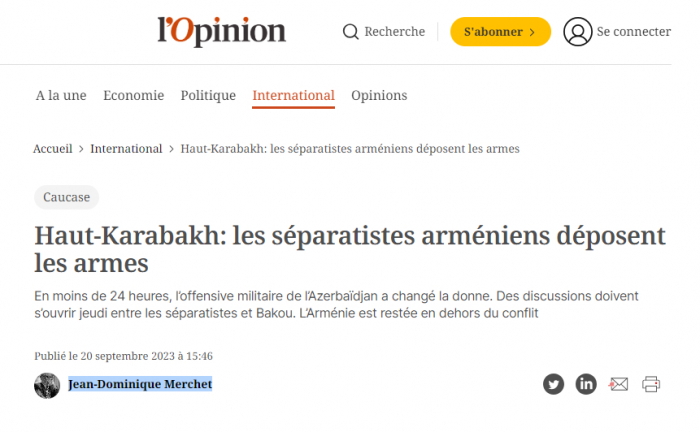The French L’Opinion published an article by Jean-Dominique Merchet titled ‘Nagorno-Karabakh: Armenian separatists laid down their weapons’ about the anti-terrorist operation performed by Azerbaijan. AzVision.az presents the article for readers:
AzVision.az presents the article for readers:
The facts
The Armenian separatist forces of Nagorno-Karabakh announced on Wednesday that they had accepted the terms of a cease-fire agreement after a series of reverses against the Azerbaijani army, who launched an anti-terrorist operation the day before. According to a communiqué of the separatists, the accord, proposed by Russia and effective at 13 local hours on Wednesday, provides for the dissolution and disarmament of the Armenian forces in the region and the withdrawal of the regular Armenian forces. Discussions on the future of the territory and the Armenians who live there will take place on Thursday between representatives of the Armenian population and Azerbaijani authorities.
Launched in the middle of the day on Tuesday, Azerbaijan's military operation appears to have achieved its objectives in less than twenty-four hours. The Armenian forces were unable to resist and de facto capitulated. A ceasefire was concluded on Wednesday between the two parties and talks should begin on Thursday in Yevlakh (Azerbaijan).
There will probably be other developments as well, but the geopolitical map of the Caucasus has just shifted before our eyes. On a local level, the Armenians of the separatist region of Nagorno-Karabakh are the vanquished, despite international protests. But, on a regional scale – and barring a political overthrow in Armenia – Russia could lose its influence in its “near abroad”, that is to say, its former empire.
The situation had been frozen since the fall of 2020, following a first Armenian military defeat. All that remained was a small enclave of approximately 3000km², a half-French department, self-proclaimed ‘Republic of Artsakh’ since 1991. This territory, separated from the Republic of Armenia by the “Lachin corridor”, was placed under the protection of 2000 Russian soldiers. According to international law, Nagorno-Karabakh is on the territory of Azerbaijan, within its 1991 borders, inherited from the Soviet division. According to the Armenians, Nagorno-Karabakh is populated by 120,000 inhabitants, a figure, Azerbaijan disputes, is only around 50,000.
The Red Line
The election, on September 9, of a new president of Artsakh was “a red line” for Baku, assures Elchin Amirbayov, advisor to the presidency of Azerbaijan. Tensions had been building since July 12, with the blockade of the region decreed by Baku, which caused a humanitarian crisis. Azerbaijan says, the detonator of a long-prepared operation was the death of eleven people on Monday, killed by mines planted by the Armenian military.
Azerbaijan accuses Armenia of having maintained a contingent of around 10,000 soldiers in Nagorno-Karabakh, including 3,000 locally recruited - which Yerevan, capital of Armenia, denied, without really convincing. This presence was contrary to the 2020 agreements. It is this armed force that the “anti-terrorist” operation launched on Tuesday attacked. Azerbaijan’s military superiority is indisputable. The country is notably supported by Türkiye and Israel.
In less than twenty-four hours, Azerbaijan’s drones and artillery attacked military assets (radar, electronic warfare, anti-aircraft systems), most of them of Russian origin, and undoubtedly “neutralized” 90 combat positions on the line of contact. Baku assures that its troops did not intend to penetrate towns and villages populated by Armenians. We do not yet have a definitive human toll. Armenian sources speak of at least 32 deaths, including seven civilians.
What will now be the fate of this Armenian population within the Republic of Azerbaijan? The Baku authorities assure that they can stay there and are considering their “reintegration” through talks with their representatives. However, mutual fears and hatred, the legacy of a long history of violence, bode poorly for the establishment of a climate of trust. Under pressure, will the people leave these lands, where they have lived for a long time, to take refuge in the neighboring Republic of Armenia? It is too early to say, but the Armenians fear “ethnic cleansing”.
Historical Error
This new defeat will have consequences in Armenia itself. Tuesday evening, demonstrators surrounded the government headquarters, demanding the resignation of Prime Minister Nikol Pashinyan. As soon as Azerbaijan attacked on Tuesday, it expressed its intention to stay out of the conflict, warning “against internal and external forces which are trying to drag Armenia into military escalation”. This pro-Western leader even mentioned the threat of a “coup d’état” by more radical elements.
Since its independence in 1991, Armenia had benefited from the protection of Moscow, whose army and border guards are present on its soil. Russian support even allowed Armenia to win the first Nagorno-Karabakh war (1988-1994) against Azerbaijan. The defeats of 2020 and 2023 show that “Russian life insurance no longer works”, according to a European diplomat. On Tuesday, the Russian contingent remained steadfast in the face of the Azerbaijani attack, contenting itself with helping civilians evacuate areas under fire.
Prime Minister Pashinyan could take advantage of this to accelerate his country's shift towards the West, moving further and further away from Moscow. “Our dependence on Russia for our security was a historic error,” he confided on September 3, while military exercises with the United States were taking place in Armenia. However, pro-Russian currents remain influential in the country. With the defeat of Nagorno-Karabakh, they could fan nationalist embers in an attempt to overthrow Pashinyan. Before being elected and re-elected, he came to power in 2018 following the democratic revolution, which was little appreciated in the Kremlin.
More about: #Azerbaijan #Armenia #Karabakh
















































